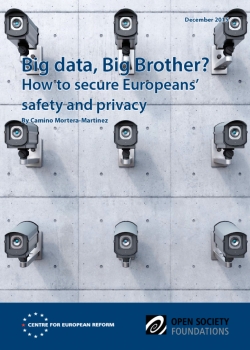
Big data, Big Brother? How to secure Europeans' safety and privacy
- Terrorism and organised crime are a serious threat to Europe, as the recent attacks in Paris show. The European Union is better placed to deal with trans-national crime and terrorists moving across borders than individual member-states. To face this growing threat, the EU needs to adopt security measures. Some of these measures (such as the use of data to trace and track how terrorists are financed, how they travel and how they communicate) have far-reaching implications for citizens’ privacy.
- As it tries to find more effective ways to combat terrorism at the European level, the EU has been struggling to find the right balance between privacy and security. There are two main reasons why: the EU’s institutional and legal framework for dealing with security issues is inadequate; and debates on security and privacy are distorted by Europe’s love/hate relationship with the US, which extends to American multinational companies. The European Parliament has been blocking important security legislation, and the Snowden revelations have damaged trust between Europe and America, threatening the operations of US companies in Europe. But the EU needs to protect its security and ensure that citizens’ rights are respected. The following proposals would help it to do so:
- The European Parliament needs to have access to confidential information, if the EU wants to overcome the current gridlock on security measures. For that, MEPs need to have security clearance. Security-vetted MEPs could be part of a special sub-committee that would be responsible for examining counter-terrorist measures.
- A recent ruling by the European Court of Justice has declared that the ‘Safe Harbour’ agreement regulating transatlantic data flows is invalid. The EU and the US should consider a legally binding bilateral treaty which would regulate these flows. They should also adopt measures, perhaps in the form of a treaty, to ensure that citizens on both sides of the Atlantic are protected from unwarranted surveillance. Transatlantic agreements in the field of commercial data transfers and surveillance will not happen immediately, but there are reasons to be optimistic: the EU and the US have been working hard to find a common ground to restore trust in transatlantic data flows, as shown by recent agreements in the field of data transfers for criminal investigations.
- Transatlantic relations would also benefit from extending Europol’s role in intelligence matters. Europol should become the main EU interlocutor with America on intelligence sharing. For this, the EU will need to convince some national intelligence agencies, who feel more comfortable working on the basis of bilateral agreements rather than pooling information at the EU level. But as proved by the recent attacks in Paris, European co-operation in intelligence sharing is vital to fight against the growing threat of foreign fighters. Europol is best placed to act as a hub for European intelligence, and as the main interlocutor with third countries such as the US.
- Encrypting digital communications helps to safeguard citizens’ privacy and to restore consumers’ trust in online service providers. But some European governments, like France or the UK, are now calling for a ban on encryption. They should think again: the EU and its member-states should support encryption, albeit with limitations. Law enforcement agencies should have access to communications when they need it – and certainly in times of emergency, following terrorist attacks. Internet companies must be able to ‘crack’ encrypted data and pass it to law enforcement.
- The Union should also make cross-border requests for information easier, by reforming Mutual Legal Assistance Treaties that regulate trans-national requests for information within the EU. The EU and the US should simplify the ways they share information, by reducing the number of overseeing agencies, and moving information requests onto a web-based platform.
Copyright is held by the Centre for European Reform. You may not copy, reproduce, republish or circulate in any way the content from this publication except for your own personal and non-commercial use. Any other use requires the prior written permission of the Centre for European Reform.

